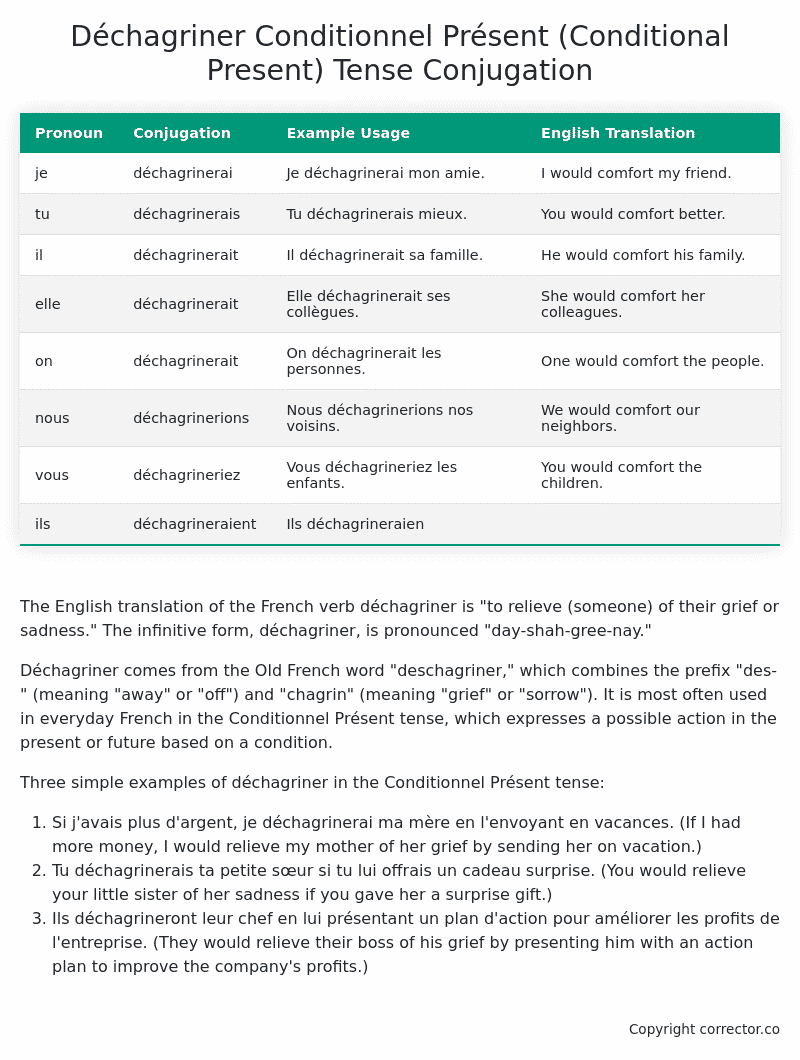Conditionnel Présent (Conditional Present) Tense Conjugation of the French Verb déchagriner
Introduction to the verb déchagriner
The English translation of the French verb déchagriner is “to relieve (someone) of their grief or sadness.” The infinitive form, déchagriner, is pronounced “day-shah-gree-nay.”
Déchagriner comes from the Old French word “deschagriner,” which combines the prefix “des-” (meaning “away” or “off”) and “chagrin” (meaning “grief” or “sorrow”). It is most often used in everyday French in the Conditionnel Présent tense, which expresses a possible action in the present or future based on a condition.
Three simple examples of déchagriner in the Conditionnel Présent tense:
- Si j’avais plus d’argent, je déchagrinerai ma mère en l’envoyant en vacances. (If I had more money, I would relieve my mother of her grief by sending her on vacation.)
- Tu déchagrinerais ta petite sœur si tu lui offrais un cadeau surprise. (You would relieve your little sister of her sadness if you gave her a surprise gift.)
- Ils déchagrineront leur chef en lui présentant un plan d’action pour améliorer les profits de l’entreprise. (They would relieve their boss of his grief by presenting him with an action plan to improve the company’s profits.)
Table of the Conditionnel Présent (Conditional Present) Tense Conjugation of déchagriner
| Pronoun | Conjugation | Example Usage | English Translation |
|---|---|---|---|
| je | déchagrinerai | Je déchagrinerai mon amie. | I would comfort my friend. |
| tu | déchagrinerais | Tu déchagrinerais mieux. | You would comfort better. |
| il | déchagrinerait | Il déchagrinerait sa famille. | He would comfort his family. |
| elle | déchagrinerait | Elle déchagrinerait ses collègues. | She would comfort her colleagues. |
| on | déchagrinerait | On déchagrinerait les personnes. | One would comfort the people. |
| nous | déchagrinerions | Nous déchagrinerions nos voisins. | We would comfort our neighbors. |
| vous | déchagrineriez | Vous déchagrineriez les enfants. | You would comfort the children. |
| ils | déchagrineraient | Ils déchagrineraien |
Other Conjugations for Déchagriner.
Le Present (Present Tense) Conjugation of the French Verb déchagriner
Imparfait (Imperfect) Tense Conjugation of the French Verb déchagriner
Passé Simple (Simple Past) Tense Conjugation of the French Verb déchagriner
Passé Composé (Present Perfect) Tense Conjugation of the French Verb déchagriner
Futur Simple (Simple Future) Tense Conjugation of the French Verb déchagriner
Futur Proche (Near Future) Tense Conjugation of the French Verb déchagriner
Plus-que-parfait (Pluperfect) Tense Conjugation of the French Verb déchagriner
Passé Antérieur (Past Anterior) Tense Conjugation of the French Verb déchagriner
Futur Antérieur (Future Anterior) Tense Conjugation of the French Verb déchagriner
Subjonctif Présent (Subjunctive Present) Tense Conjugation of the French Verb déchagriner
Subjonctif Passé (Subjunctive Past) Tense Conjugation of the French Verb déchagriner
Subjonctif Imparfait (Subjunctive Imperfect) Tense Conjugation of the French Verb déchagriner
Conditionnel Présent (Conditional Present) Tense Conjugation of the French Verb déchagriner (this article)
Conditionnel Passé (Conditional Past) Tense Conjugation of the French Verb déchagriner
L’impératif Présent (Imperative Present) Tense Conjugation of the French Verb déchagriner
L’infinitif Présent (Infinitive Present) Tense Conjugation of the French Verb déchagriner
Struggling with French verbs or the language in general? Why not use our free French Grammar Checker – no registration required!
Get a FREE Download Study Sheet of this Conjugation 🔥
Simply right click the image below, click “save image” and get your free reference for the déchagriner Conditionnel Présent tense conjugation!

Déchagriner – About the French Conditionnel Présent (Conditional Present) Tense
Formation
Common Everyday Usage Patterns
Expressing Polite Requests
Expressing Hypothetical Situations
Expressing Doubt or Uncertainty
Interactions with Other Tenses
Present Tense
Past Tense
Future Tense
Conditional Perfect
Summary
Want More?
I hope you enjoyed this article on the verb déchagriner. Still in a learning mood? Check out another TOTALLY random French verb conjugation!


